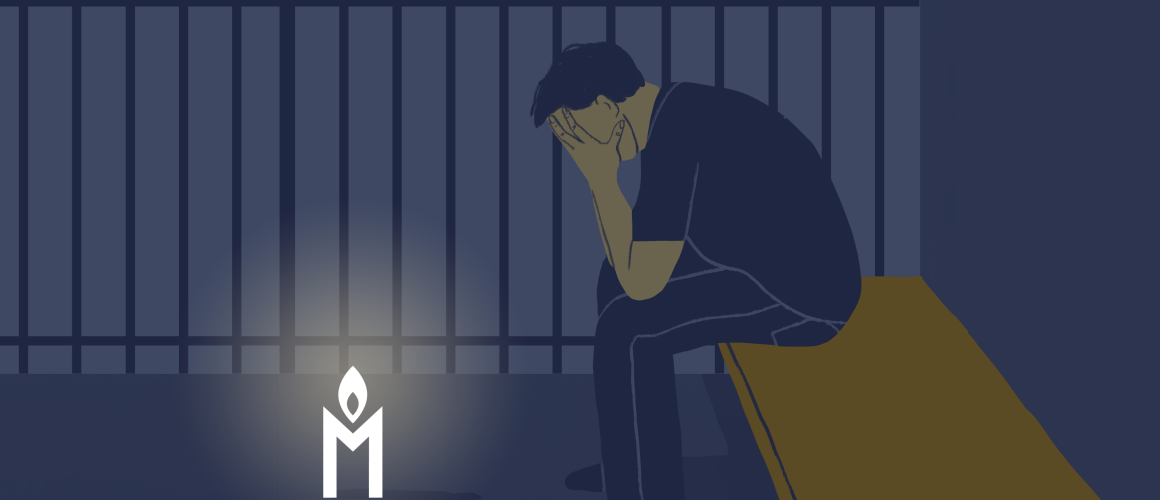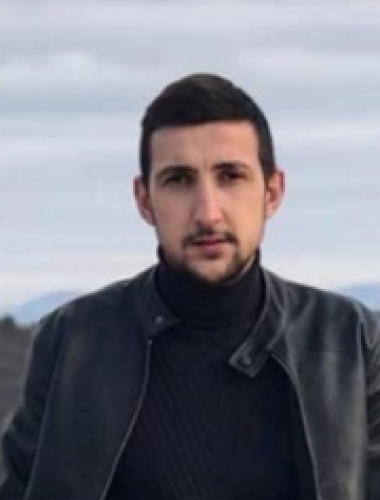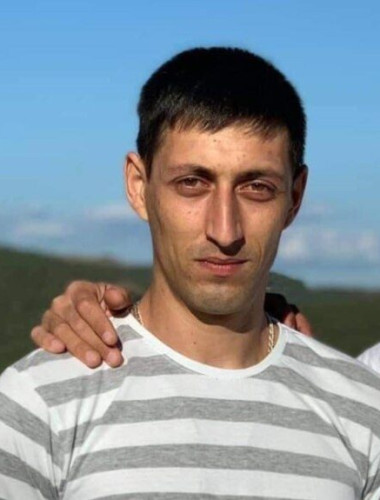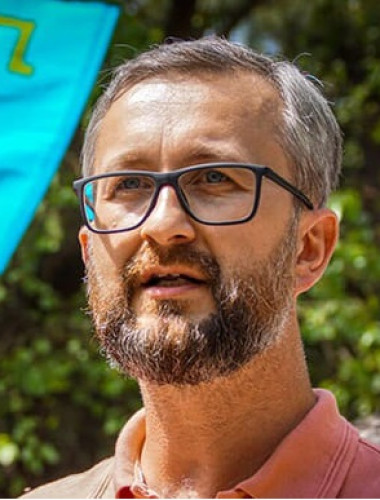Three Crimean Tatars convicted of sabotage are political prisoners
Nariman Dzhelyal, Asan Akhtemov and Aziz Akhtemov were sentenced to terms of imprisonment ranging from 13 to 17 years. The charges were fabricated, and during the investigation both those convicted and witnesses in the case were subjected to torture by the FSB
The human rights project, ‘Political Prisoners. Memorial,’ in accordance with international standards, considers Asan Akhtemov, Aziz Akhtemov and Nariman Dzhelyal (Dzhelyalov) political prisoners. Dzhelyal and the Akhtemov brothers have been prosecuted on fabricated criminal charges of sabotage for their political views and public activity in the Crimean Tatar national movement. Their prosecution has been part of a campaign by the Russian authorities to suppress independent civil society activity among Crimean Tatars. We demand the immediate release of Asan Akhtemov, Aziz Akhtemov, and Nariman Dzhelyal and that all criminal charges against them be dropped.
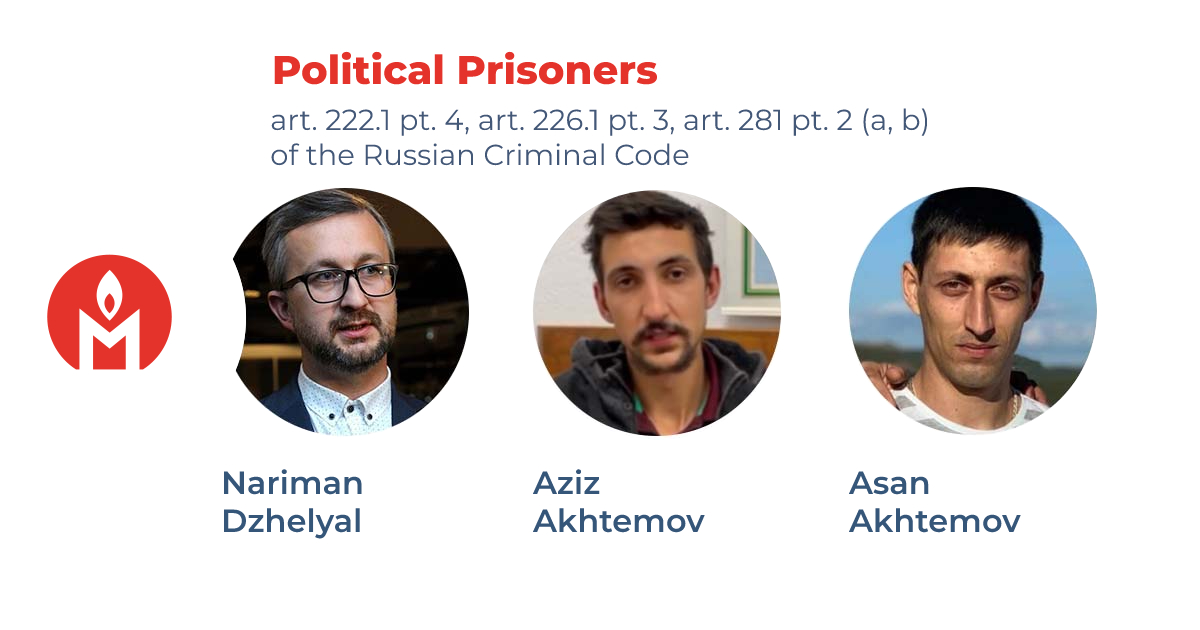
What were the criminal charges against them?
On 23 August 2021 there was an explosion on a gas pipeline near the village Perevalnoe in Crimea. As a result, a military unit located nearby had to be supplied with energy from reserve sources for about a day. The damage from the explosion amounted to just over 100,000 roubles (about $1350 at the date of the explosion).
Over two days (3 – 4 September 2021) a week after the incident, houses of Crimean Tatars were subjected to searches. Five people, including Nariman Dzhelyal, Asan Akhmetov and Aziz Akhtemov, were detained. They were all held in the building of the Federal Security Service (FSB) in Simferopol for about a day, after which Dzhelyal and the Akhtemov brothers were remanded in custody while two other detainees were qualified as witnesses in the criminal case.
Asan Akhmetov and Aziz Akhtemov were charged with blowing up the gas pipeline on the instructions of the Ukrainian intelligence service. Nariman Dzhelyal was initially accused of complicity in sabotage, but then the charges against him were reclassified to be the same as those against the Akhtemov brothers. All three were charged with sabotage (Article 281, Part 2 (a & b), of the Russian Criminal Code), possession of an explosive device (Article 222.1, Part 4, of the Russian Criminal Code), and smuggling of an explosive device (Article 226.1, Part 3, of the Russian Criminal Code) as part of an organised group.
On 21 September 2022, the Supreme Court of Crimea found all three guilty and sentenced them to terms in a strict regime penal colony. Nariman Dzhelyal was sentenced to a term of 17 years, Asan Akhtemov to 15 years and Aziz Akhtemov to 13 years.
Why do we consider them political prisoners?
From the very beginning of the case, the investigation was conducted with numerous violations.
After lawyers were able to gain access to those Crimean Tatars detained in September, the detainees, independently of one another, all said they had been subjected to torture and threats by FSB officers. Not only the defendants, but also witnesses in the case described being interrogated with a bag over their heads, having their hands tied with sticky tape and being beaten. Three of those detained claimed they had been tortured with electric shocks.
The Akhtemov brothers accused their court-appointed lawyers of collusion with the investigative authorities and recanted confessions obtained under torture. Nevertheless, this initial testimony formed the basis for the charges in the case. We emphasize that evidence obtained under torture, as well as other fabricated evidence, is inadmissible.
The case of Dzhelyal and the Akhtemov brothers is a vivid example of the repression of Crimean Tatar activists in Russia. Since the annexation of the peninsula in 2014, Crimean Tatars have been subjected to systematic pressure from the Russian authorities.
Nariman Dzhelyal, we note, was the only deputy chair of the Mejlis of the Crimean Tatar People, an organisation declared extremist in Russia, to have remained in Crimea. We believe this is why Dzhelyal was charged with the crime of sabotage, and the Akhtemov brothers were so charged because they were his acquaintances.
Further information about the prosecution of Nariman Dzhelyal, Asan Aktemov and Aziz Akhtemov and the position of the human rights project, ‘Political Prisoners. Memorial,’ are available on our Telegram publishing platform.
An up-to-date list of political prisoners in Russia is available on our website.
Recognition of an individual as a political prisoner does not imply the ‘Political Prisoners. Memorial’ project agrees with, or approves of, their views, statements, or actions.
How can you help?
You can donate to help all political prisoners in Russia.
